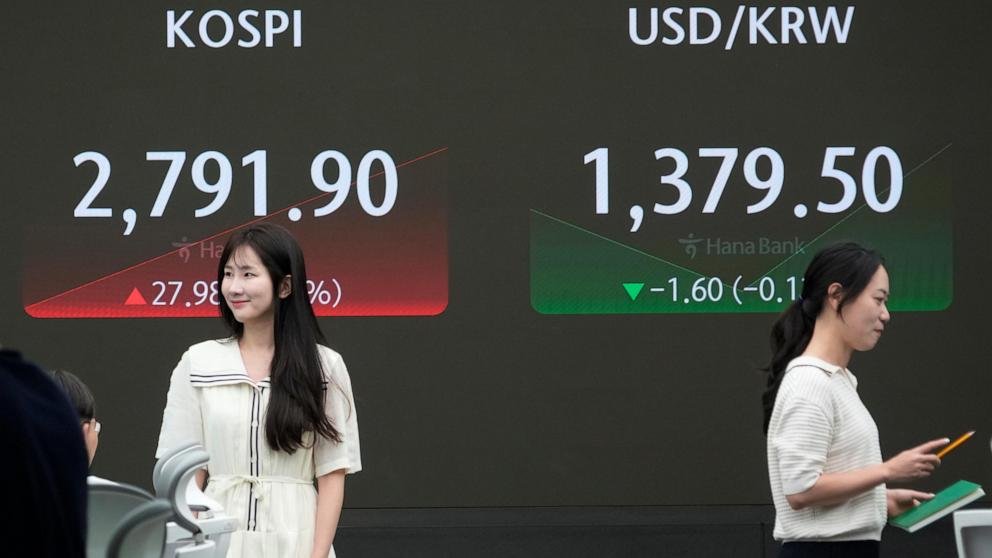Global stock markets were mixed after U.S. indexes hit yet another record high following the latest signs that the U.S. economy may be slowing without falling into recession.
HONG KONG — Global stocks were mixed on Wednesday after U.S. stock indexes rallied to yet another record high following the latest signs that the U.S. economy may be slowing without falling into recession.
Futures for the Dow Jones Industrial Average fell 0.1%, while futures for the S&P 500 rose 0.1%. U.S. markets were closed on Wednesday in observance of Juneteenth Day.
European stock markets opened lower. In London, the FTSE 100 fell 0.2% to 8,177.86 after data showed British inflation had fallen below the central bank’s 2% target. The data also confirmed market expectations that the Bank of England would keep interest rates unchanged at 5.25% when it meets on Thursday.
Germany’s DAX index fell 0.1% to 18,109.65, while Paris’ CAC 40 index lost 0.2% to 7,615.76.
Tokyo’s Nikkei stock average rose 0.2% to 38,570.76. Japan’s trade data for May showed exports rose 13.5% from a year earlier, while imports rose 9.5%, helped by rising prices and a weaker yen against the dollar.
Minutes from the Bank of Japan’s latest policy meeting showed policymakers debated whether a weaker yen could push up inflation further, and Governor Kazuo Ueda has signaled he could raise interest rates in the coming months, depending on economic data at the time.
“The Nikkei’s movements reflect current volatility, with the index trading in a broad consolidation so far,” IG Asia said in a commentary.
Hong Kong’s Hang Seng Index rose 2.9% to 18,430.39, while the Shanghai Composite Index fell 0.4% to 3,018.05 after the head of China’s securities regulator said at a financial forum in Shanghai that the government would step up supervision of all financial activities to prevent potential risks.
In Sydney, the S&P/ASX 200 lost 0.1% to 7,769.70. South Korea’s KOSPI rose 1.2% to 2,797.33.
Meanwhile, Taiwan’s Taiex rose 2%, while Bangkok’s SET fell 1%.
On Tuesday, the S&P 500 rose 0.3% to 5,487.03, its 31st all-time high this year. The Nasdaq Composite Index rose less than 0.1%, to 17,862.23. The Dow Jones Industrial Average rose 0.2%, to 38,834.86.
Nvidia was the star again, rising 3.5% to be the strongest driver lifting the S&P 500. The company’s market capitalization once again surpassed $3 trillion.
The Commerce Department reported that retail sales rose 0.1% in May, less than economists had expected, while April sales were revised down from flat to a 0.2% decline.
That could signal that household spending, the main engine of the U.S. economy, is collapsing. Inflation has slowed from its peak but remains high, and lower-income households in particular are struggling to keep up with rising prices.
In other trading on Wednesday, benchmark U.S. crude oil fell 15 cents to $80.56 a barrel in electronic trading on the New York Mercantile Exchange.
Brent crude fell 17 cents to $85.16 a barrel.
The dollar fell to 157.76 yen from 157.87 yen. The euro fell to 1.0736 dollars from 1.0738 dollars.

